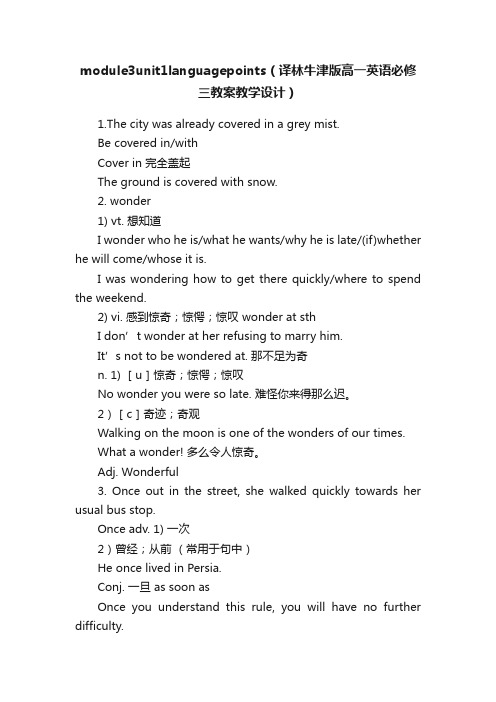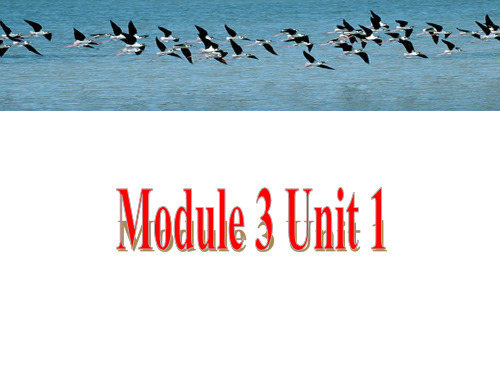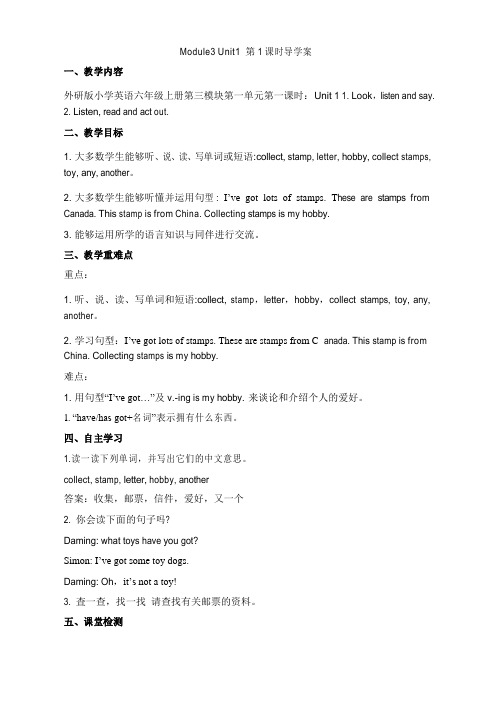Module3 Unit1 Remember to look out for the red light
外研新标准初中英语八年级下册Module 3 《Unit 1 Remember to look out for the red light》课件-文档资料

6. It’ll start ______ in the afternoon. A. raining B. rainy C. rain
latest newsreader rain Sporrte:port latreespt orrteeprort rreesuplotrter
score resusltunsncyore winwin
latest rain report Weather: reporter sunny
2 Answer the questions. 1. What’s the latest news?
3. How do you think the friends feel about visiting Radio Beijing?
They feel excited.
5 Complete the passage with the correct form of the words in the box.
account; tell; cover v. 报道 n. 报道
report
newsman; newsperson
n. 新闻记者
reporter
mark; get n. 成绩; 分数 v. 得分
everyone
pron. 每个人
score everybody
make reference to
v. 提及
to pay attention to
小心
look out for
module3unit1languagepoints(译林牛津版高一英语必修三教案教学设计)

module3unit1languagepoints(译林牛津版高一英语必修三教案教学设计)1.The city was already covered in a grey mist.Be covered in/withCover in 完全盖起The ground is covered with snow.2. wonder1) vt. 想知道I wonder who he is/what he wants/why he is late/(if)whether he will come/whose it is.I was wondering how to get there quickly/where to spend the weekend.2) vi. 感到惊奇;惊愕;惊叹 wonder at sthI don’t wonder at her refusing to marry him.It’s not to be wondered at. 那不足为奇n. 1) [u]惊奇;惊愕;惊叹No wonder you were so late. 难怪你来得那么迟。
2)[c]奇迹;奇观Walking on the moon is one of the wonders of our times.What a wonder! 多么令人惊奇。
Adj. Wonderful3. Once out in the street, she walked quickly towards her usual bus stop.Once adv. 1) 一次2)曾经;从前(常用于句中)He once lived in Persia.Conj. 一旦 as soon asOnce you understand this rule, you will have no further difficulty.4. The truth is that the fog is too thick for the bus to run that far.That the fog is too -------- 是一个表语从句Too-------(for sb) to------- 太-------而不能-------It’s too hot to work.That far 那么远 that可以作副词,修饰形容词或副词,表示程度I’m sorry. I hadn’t realized the situation was that bad.对不起,我没料到情况有那么糟。
外研社小学英语一年级起点四年级下册 Module3 Unit1 单词学习

自然拼读:ill 新学
山丘 hill
村庄 village
谎话 lie
教训 lesson
名词 sheep wolf
hill village
lie lesson
含义
绵羊 狼 山丘 村庄 谎话 教训
03 其他词
Part One
once upon a time 很久以前
中文 每一天 每一个早上 每一个星期
Module3 Unit1 单词学习
目录 动词 名词
其他词
01 动词
Part One
自然拼读:ay
说 say “I want a big ship.” said the bad man. (said是say的动词过去式)
自然拼读:ea
吃 eat We ate candies. (ate是eat的动词过去式)
其他词 once upon a time
everyone up
down wouldn’t=would not
含义
很久以前 每个人 向上 向下 不会
谢谢观看
made by Septem
2.“Help, help!”,this boy _s_h_o_ut_e_d_____(shout) yesterday.
3.“You naughty pig!”,this girl _la_u_g_h_e_d______(laugh) yesterday.
动词原形 say eat run
look after come up
shout laugh learn
tell
动词过去式
said ate ran looked after came up shouted laughed learnt told
Module 3 Unit 1

Phrases: 1.glance 3. sight 7. relief 2. 情不自禁做某事 4. for 8. out 5. reach 9. pay 11.by 15. to 12. related 16. into 6. stare
10. 通过;使…被理解 13. close 14. sudden
Sentences: I. Once a worker, he now is a famous singer. 2. I’d be only too happy to help. 3. The problem is hard to work out. 4. This year we have produced twice as many as we did last year.
lost 1. a woman _____in the fog雾中迷路 的妇女 2. run ____far that 跑那么远 to ___ be seen 3. nowhere ___ ___无处被看见 4. ____ beat with fear由于害怕而心跳 5. ____ to come along企盼有 wish ____sb. for 人出现 with/wearing 6. an old man ____________a beard 长着络腮胡子的老人 hesitate 7. ________about 对…犹豫 attach 8. ______importance to重视
2. There was no one in sight. 1) They fell in love with each other ___________ at first sight (乍一看, 初次看见时). 2) We laughed _______________ (一看见) his at the sight of strange clothes. 3) The train is still _______________ in/within sight (看得见, 在 眼前) in the heavy fog. 4) The house ______________ was out of sight (看不见了) behind a high wall. 5) I happened to ________________ (看见) John catch sight of as he was going past our office. 6) A person who _______________ loses his sight (失明) is called a blind man. 7) Many students are ____________ short-sighted (近视) because they don’t care for their eyes.
外研版(三起点)六年级英语上册《Module3__Unit1__第1课时导学案》

Module3Unit1第1课时导学案一、教学内容外研版小学英语六年级上册第三模块第一单元第一课时:U nit1 1.Look,listen and say.2.Listen,read and act out.二、教学目标1. 大多数学生能够听、说、读、写单词或短语:collect,stamp,letter,hobby,collect stamps, toy,any,another。
2. 大多数学生能够听懂并运用句型: I’ve got lots of stamps.T h ese are stamps from Canada.This stamp is from China.Collecting stamps is my hobby.3. 能够运用所学的语言知识与同伴进行交流。
三、教学重难点重点:1. 听、说、读、写单词和短语:collect,stamp,letter,hobby,collect stamps,toy,any, another。
2. 学习句型:I’ve got lots of stamps.These are stamps from C anada.This stamp is from China.Collecting stamps is my hobby.难点:1. 用句型“I’ve got…”及v.-ing is my hobby.来谈论和介绍个人的爱好。
1.“have/has got+名词”表示拥有什么东西。
四、自主学习1.读一读下列单词,并写出它们的中文意思。
collect, stamp,letter,hobby,another答案:收集,邮票,信件,爱好,又一个2.你会读下面的句子吗?Daming:what toys have you got?Simon:I’ve got some toy dogs.Daming:Oh,it’s not a toy!3.査一查,找一找请查找有关邮票的资料。
外研版英语八年级下册 Module3unit1笔记

Module 3 Journey to spaceUnit 1 Has it arrived yet?一、.短语1.你在忙什么?What are you up to be up to...(名词、代词或-ing形式) 忙于、正在做....2.最新消息the latest news3.上新闻:on the news (介词短语)4.去过月球have been to the moon5.远离、遥远:be far ( away )1) sw. be far ( away ) from sw 某地离某地远2) sw be 数词kilometer(s)/ meter(s) (away ) from sw 某地离某地有多远=It is 数词kilometer(s)/ meter(s) (away ) from sw to sw.My home is 10 kilometers from the school .=It is 10 kilometers from my home to the school.6.为了做某事in order to do sth. (放句首或句中)7. 上网: go online8..搜索信息search for information 9. 获取有关....信息:get information on...一、1. What are you up to?你在干什么呢?2.Do you want to stay or go? It’s up to you. 你要留还是要走?你自己定。
3.You don’t look well.What’s up?你看起来不好。
怎么了?1)be up to... 后接名词、代词或-ing形式用来表示“正在做什么事、忙于某事”2)be up to sb 由……决定3)What’s up意为怎么了?相当于:What’s wrong / What’s the matter?二、Have you heard the latest news? 你听说最新的消息了吗?test 1). adj. 最新的;最近的2). adj. 最迟的;adv. 最迟地1)你看了最新的报纸了吗?Have you read thelatest newspaper?2)今早他是最迟到校的。
外研版小学五年级英语下册课文翻译

Module1unit1part1thereare 有,后面跟可数名词复数看,椅子上有两只漂亮的猫咪。
现在只有一只。
好吧,(刚刚)有两只。
part2玲玲仍然与萨姆和埃米在英国。
看,玲玲!它是一个关于中国的节目。
快来看看! 我来了!许多年前,中国的生活(与现在)大不相同。
life 生活 复数是lives有什么不同呢?(那时)我们住在一座小房子里。
我们没有足够的食物。
没有很多公共汽车。
livein 住在 没有电视机。
现在怎么样呢?(现在)我们住在一座大房子里。
我们有许多食物。
有许多公共汽车和小汽车。
我每天看电视。
昨天我(还)与我的孙子孙女一起看电视了呢。
alotof=lotsof 谢谢你与我们谈话。
Thankyoufor+名词或动词ing 形式表示因为某事感谢别人。
中国正在变化着。
我想念中国!我想念我的祖母!unit2 part1他有强壮的退。
他能跳的很远。
但是他那时候还没有腿。
part2亲爱的大明:昨天晚上,我看了一个关于中国的电视节目。
一位老妇人谈到多年前她的生活。
她在田里劳作。
她在炉火上做饭。
她没有电视机和收音机。
火上她没有电话。
她不会读也不会写。
couldn’t=couldnot 我想念我的祖母。
我也想念你! 希望你一切都好。
爱你的, 玲玲不能inthefield在田地里onthefire 在Module2unit1part1她学习跳舞。
learnt学习原形learn她学习做饭。
她教语言并写书。
taught教原形teachModule2unit1part2玲玲,他们是谁?他们是我的祖父母。
这是谁?是我祖母。
她曾经是个舞蹈演员。
她在中国的许多城市都演出过。
dancer舞蹈演员动词形式dance 跳舞她学过外语吗吗?是的,她学过英语。
这是你祖父吗?是的。
他曾是一位司机。
driver司机动词形式drive驾驶他也学过英语吗?不,他没学过。
但是现在他正在学英语。
learn学习现在分词learningunit2part1李伟那时六岁。
外研版(三起)-英语-六年级上册-Module3__Unit1__第1课时教案

Module3 Unit1 第1课时教案一、教学内容外研版小学英语六年级上册第三模块第一单元第一课时:Unit 1 1. Look,listen and say. 2. Listen, read and act out.二、教学目标1. 大多数学生能够听、说、读、写单词或短语:collect, stamp, letter, hobby, collect stamps, toy, any, another。
2. 大多数学生能够听懂并运用句型: I’ve got lots of stamps. The se are stamps from Canada. This stamp is from China. Collecting stamps is my hobby.3. 能够运用所学的语言知识与同伴进行交流。
三、教学重难点重点:1. 听、说、读、写单词和短语:collect, stamp,letter,hobby,collect stamps, toy, any, another。
2. 学习句型:I’ve got lots of stamps. These are stamps from Can ada. This stamp is from China. Collecting stamps is my hobby.难点:1. 用句型“I’ve got…”及v.-ing is my hobby. 来谈论和介绍个人的爱好。
2. “have/has got+名词”表示拥有什么东西。
四、教学准备1.单词卡片。
2.同步课文动画。
3.第1课时教学课件。
4.人物大明和西蒙的头饰。
五、教学设计Step 1 Warm-up1. Have a dictation of the new words of Module2.2. Let’s sing.Let the students sing the song of Page 12 together.【设计思路】通过听写复习了前面所学到的知识,通过歌曲让学生快速地进入学习状态。
- 1、下载文档前请自行甄别文档内容的完整性,平台不提供额外的编辑、内容补充、找答案等附加服务。
- 2、"仅部分预览"的文档,不可在线预览部分如存在完整性等问题,可反馈申请退款(可完整预览的文档不适用该条件!)。
- 3、如文档侵犯您的权益,请联系客服反馈,我们会尽快为您处理(人工客服工作时间:9:00-18:30)。
Module3 Unit1 Remember to look out for the red light
By Qin Liqing
【Teaching aims】
1.To practice giving advice and warnings and talking about memories.
2.To grasp the use of verbs followed by –ing. eg: enjoy, like, start etc.
3.To learn how to speak on the radio.
【Important and difficult points】
1.To practice listening and speaking of the topic: on the radio.
2.To grasp the vocabulary and the main sentence structures.
【Teaching methods】
Listening an speaking
【Teaching aids】
Tape recorder, video
【Teaching steps】
Step1: Warm up and Lead in
Teacher’s Activity: Do you often listen to the radio? ( “yes”/ “no”) Do you want to know how the newsreaders give the reports on the radio? This class we will learn module 1 unit1.
Students’ Activity:
1.Read through the words.
2.Listen and match.
3.Do the exercises in Activity5. Complete the passage with the correct form of the
words in the box in Activity1. And then check the answers.
Step2: Listening
Teacher’s Activity: Ask students to close their books and listen with the questions in Activity4.
Students’ Activity:
1.Listen to the dialogue carefully with the questions in Activity4.
2.Listen again and answer the questions in Activity4. And then check the answers. Step3: Reading
Teacher’s Activity:
1.Ask students to read aloud in groups.
2.Ask stu dents to read individually and underline those they are not able to …the
class to solve their problems.
3.Show some common problems and discuss in class.
Students’ Activity:
1.Read in groups aloud.
2.Read and underline the difficulties.
3.Ask advice from the teacher to tackle difficulties.
4.Answer the questions in Activity7.
Step4: Grammar focus and practice
Teacher’s Activity: Give students a sentence of giving advice: Remember to look out for the red light. Then ask students to practice:
1.We’d like to thank you.
2.I remember listening to the radio.
3.Everyone needs to speak English well.
4.I enjoy showing visitors around.
5.Stop talking.
6.Keep studying.
7.I hate losing.
8.It’ll start raining in the afternoon.
9.Just tell me what you had for breadfast.
Students’ Activity:
1.Read the sentences about giving advice.
2.Take notes of the key structures.
3.Practice the sentences in pairs.
Step5:Exercices
【Blackboard design】。
